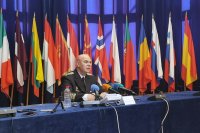
Over the past two weeks, thirty students from universities in Bulgaria, the Republic of North Macedonia, France, and Germany visited several Balkan capitals—Skopje, Pristina, and Sofia—as part of a project funded by the Franco-German Youth Office and supported by the Embassies of France and Germany in Bulgaria and North Macedonia.
The traveling summer university, titled "Rethinking Europe Together", offers students of political science and international relations from these four countries the opportunity to engage in meetings with former presidents and prime ministers from the Western Balkans, as well as with members of parliament, diplomats, NGO experts, and scholars focused on European and Balkan affairs. Discussions revolved around topics related to integration and strengthening regional ties.
In Sofia, the students held discussions with members of the Bulgarian Parliament’s Committees on Foreign Affairs and European Affairs, as well as with experts from the European Council on Foreign Relations and the Sofia Security Forum. Key themes included the future of the European Union, security risks in the Black Sea region, EU enlargement prospects in the Western Balkans, Bulgarian–Macedonian relations, the influence of external actors in the region, and the complex relationship between Belgrade and Pristina.
The students were mentored by Dr. Petya Georgieva from the Department of Political Science at New Bulgarian University and Prof. Dr. Ivan Damianovski from the Faculty of Political Science at Ss. Cyril and Methodius University in Skopje.
According to Dr. Georgieva, the students showed strong interest in Balkan affairs:
“We saw a broadening of perspective—Bulgarian students gained a better understanding of the hopes and challenges faced by their Macedonian colleagues, and I believe Macedonian students, in turn, acquired a more realistic view of Bulgarian sentiments and values. It was particularly enriching for the German and French students, who came with only theoretical knowledge but gained field experience and witnessed firsthand how Bulgarian and Macedonian students interact. They participated in joint activities and workshops and, in the evenings, they enjoyed spending time together informally.”
How interesting are the problems in the Balkans for the students from France and Germany, because on one side are the Bulgarian-Macedonian relations and on the other side are the relations between Serbia and Kosovo?
Those chosen to take part in this project have an educational and personal interest to broaden their knowledge.I think that some issues in the Balkans, such as the dispute between Sofia and Skopje, are difficult to understand because we are talking about two nations that actually get along very well when they have informal contacts. This is not about territorial claims and classical type of conflict, but it is about disputes concerning history and identity, which are difficult to understand from the outside. When students from France and Germany take part in classes at this travelling university, they get a clearer idea of what is being argued about and where the problems lie. I would like to say that these young people share many common values, have common problems and similar ambitions, and there is very good ground for future cooperation and more solidarity.
Prof. Dr. Ivan Damjanovski emphasised that young people from the region, as well as from Germany and France, can work together and contribute to Balkan stability:
“Yes, they get along well—despite the broader political and societal tensions that exist today. Within this group of students, both in Sofia and earlier in Skopje, there were no misunderstandings or conflicts that couldn't be resolved through civil debate. From day one, the students from Bulgaria and North Macedonia, along with their German and French peers, immediately bonded. They demonstrated a high level of socialisation, which included meaningful communication and enjoyable interaction. One student even noted that the informal conversations and friendships formed outside of the lectures and official meetings were the most valuable aspect of the trip.”
“These types of students—those studying the social sciences—tend to behave similarly in similar settings. The greater risk of radicalisation or exposure to nationalist rhetoric exists among other youth groups who do not engage in such exchanges. These are often the ones we hear about in the media.”
BNT: You also visited Pristina and met with Kosovo’s Prime Minister Albin Kurti. How did the students, as future diplomats and regional experts, perceive the Serbia–Kosovo tensions?
Prof. Dr. Ivan Damjanovski: "I can speak for our group, because unfortunately, we had no opportunity in Kosovo to discuss with their students. This group had the opportunity to learn about a different type of conflict than the problems they currently have between Bulgaria and North Macedonia. So I think students from Germany and France who are not as into this issue and the political dynamics are seeing how complex these issues can be. And how much more challenging it can be to resolve such bilateral disputes that have an even deeper historical dimension. They also have another dimension of real conflict that has recently passed. This year we had something different from last year to visit another country where to discuss another problematic example in the region opened up new possibilities on how to achieve a satisfactory level of reconciliation both between countries and their peoples. We have seen what conflicts look like that have an ethnic problem in the past. So, this summer seminar enters into a process of expanding innovation and conflict is actually a very good opportunity for these young people , to learn about the complexities of political and social life in this region."
The programme’s goal is to foster dialogue at the student level between Balkan countries and their peers from Germany and France, enabling them to further develop and strengthen the European project—one currently facing serious challenges. It encourages cooperation among young leaders from Humboldt University in Berlin, New Bulgarian University in Sofia, Sciences Po Dijon Campus in Paris, and Ss. Cyril and Methodius University in Skopje. The programme includes study visits not only to North Macedonia, Kosovo, and Bulgaria but also to Germany and France.
 Economy Minister Orders On-Site Checks at Electricity Suppliers Following Surge in Complaints
Economy Minister Orders On-Site Checks at Electricity Suppliers Following Surge in Complaints
 Sunken Fishing Vessel off Sozopol Shows No Breaches or Holes in the Hull, Navy Chief Says
Sunken Fishing Vessel off Sozopol Shows No Breaches or Holes in the Hull, Navy Chief Says